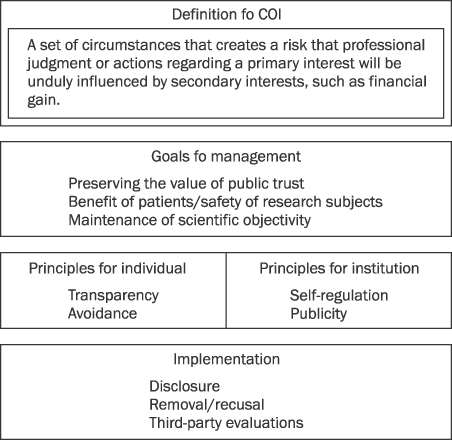Korean J Gastroenterol.
2012 Sep;60(3):149-154. 10.4166/kjg.2012.60.3.149.
Conflict of Interest in Medical Practice and Research
- Affiliations
-
- 1Department of Internal Medicine, Gangnam Severance Hospital, Yonsei University College of Medicine, Seoul, Korea.
- 2Department of Medical Ethics and Law, Yonsei University College of Medicine, Seoul, Korea. arete2@yuhs.ac
- KMID: 1389722
- DOI: http://doi.org/10.4166/kjg.2012.60.3.149
Abstract
- In recent years, medical professionals are in charge with multiple roles. They have to work as an educator, researcher, and administrator, as well as medical practitioner. In addition, they experience a conflict between the primary responsibilities that each role requires of them. A conflict of interest (COI) is a set of circumstances that creates a risk that professional judgment or actions regarding a primary interest will be unduly influenced by a secondary interest. It occurs when an individual or organization is involved in multiple interests, one of which could possibly corrupt the motivation for an act in the other. The COI should be managed appropriately to preserve the value of public trust, scientific objectivity, and the benefit and safety of patients. Primary interest of medical professionals refers to the principal goals of the medical profession, such as the health and safety of patients, and the integrity of research. Secondary interest includes not only financial gain but also such motives as the desire for professional advancement and the wish to do favors for family and friends, but COI rules usually focus on financial relationships because they are relatively more objective, fungible, and quantifiable. This article will briefly review the COI in medical practice and research, discuss about what is COI, why we should manage it, and how we can manage it.
Keyword
MeSH Terms
Figure
Reference
-
1. Gelsinger P. Jesse's intent. Bull Med Ethics. 2002. (179):13–20.2. Gelsinger P, Shamoo AE. Eight years after Jesse's death, are human research subjects any safer? Hastings Cent Rep. 2008. 38:25–27.3. Hampson LA, Bekelman JE, Gross CP. Emanuel EJ, Grady CC, Crouch RA, Lie RK, Miller FG, Wendler DD, editors. Empirical data on conflicts of interest. The Oxford textbook of clinical research ethics. 2008. New York: Oxford University Press;767–779.4. Kwon I. The meaning of medical professionalism for the faculty members of medical school and university hospitals in Korea. J Korean Med Assoc. 2011. 54:1146–1153.5. DeAngelis CD, Fontanarosa PB. Ensuring integrity in industry-sponsored research: primum non nocere, revisited. JAMA. 2010. 303:1196–1198.6. Lee IK, Koo YM. Ethical principles in physician-pharmaceutical industry interactions. Korean J Med Ethics. 2011. 14:193–201.7. Kang MS, Koh YS. Management of conflicts of interest in physician-pharmaceutical industry Interaction. Korean J Med Ethics. 2011. 14:361–371.8. Thompson DF. Understanding financial conflicts of interest. N Engl J Med. 1993. 329:573–576.9. Brody H. Hooked: Ethics, the medical profession, and the pharmaceutical industry. 2008. Lanham: Rowman & Littlefield;23–50.10. Pellegrino ED. Toward a virtue-based normative ethics for the health professions. Kennedy Inst Ethics J. 1995. 5:253–277.11. Jonsen AR. The new medicine and the old ethics. 1944. Cambridge: Harvard University Press.12. O'Neill O. Autonomy and trust in bioethics. 2002. Cambridge: Cambridge University Press.13. Kim SW, Hong JH, Kim OJ. Influence of physician-pharmaceutical industry interaction upon research. Korean J Med Ethics. 2011. 14:343–360.14. Ethical considerations in the conduct and reporting of research: Peer review. [Internet]. 2009. cited 2012. Philadelphia: International Committee of Medical Journal Editors;Available from: www.icmje.org.


